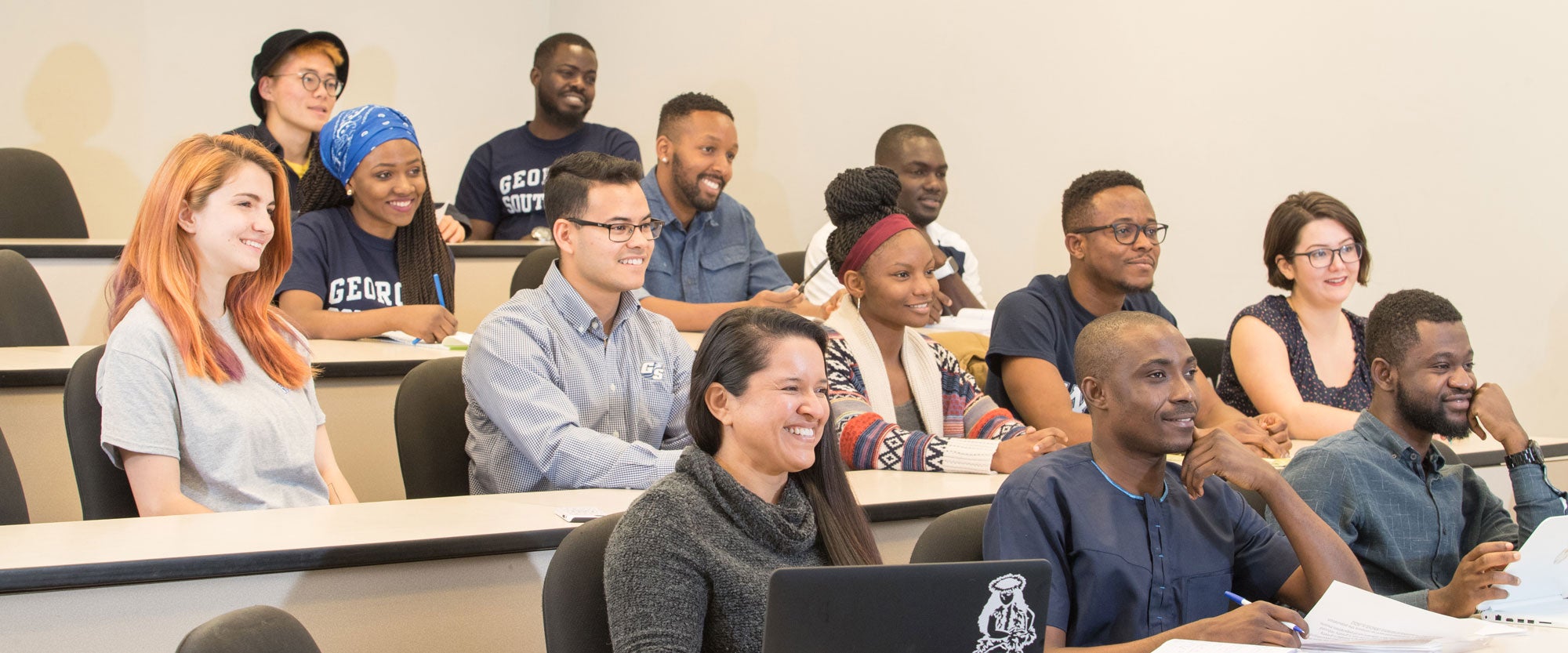Dive into one of the world’s most influential languages, developing fluency and exploring Germany’s profound contributions to art, science, business, and global industry.
Locations
- Statesboro Campus
- Online
Why Get your Bachelor of Arts in German at Georgia Southern?
Majoring in German at GSU immerses you in the language and culture of Europe’s largest economy, broadening your global perspective and enhancing your career prospects.
Our program transcends mere language acquisition, offering profound insights into the rich cultural heritage of German-speaking countries. Through a curriculum that emphasizes conversation, literature, history, and current affairs, you’ll develop the ability to listen, speak, read and write—all taught predominantly in German for an authentic immersive experience. Small class sizes and personalized instruction from dedicated faculty help you gain practical skills and cultural literacy—assets that give you an edge as a candidate in fields like international business, diplomacy, and education.
Whether you’re aiming to connect with your heritage, work abroad, or pursue advanced studies, a German degree from Georgia Southern equips you with the linguistic prowess and analytical acumen needed to thrive in our increasingly globalized world.
Ready to Apply?
What Can You Do With a Bachelor’s Degree in German?
Unlock career opportunities in business, government, and culture by mastering the language of Europe’s largest economy.
With a bachelor’s degree in German, you’ll be well-positioned for roles in international trade, diplomacy, and global marketing—areas where proficiency in the language is highly valued. The cultural insights you’ll gain through studying German literature, history, and philosophy help prepare you for a dynamic career in fields like education, journalism, business, engineering and the arts.
Whether you aspire to become a translator, foreign service officer, or work in engineering, a German degree equips you with sought-after skills for today’s global workforce.
Where our graduates work:
- International Aid
- Education and Research
- Government
- Airline Industry
- Human Resources
- International Business
What our graduates do:
- Translator
- Interpreter
- Intelligence Analyst
- Educator
- Politics
- International Aid
- International Business
What You’ll Learn
As a German major, you’ll develop comprehensive language skills while exploring the rich cultural, literary, and historical contexts of the German-speaking world.
Your coursework will enhance your proficiency in listening, speaking, reading, and writing through primarily German-conducted classes, ensuring an immersive learning experience. You’ll delve into the heritage of Germany, Austria, and Switzerland, studying modern German literature, film, business language, and contemporary society. In small, interactive classes, you’ll gain a deep understanding of German culture and language, sharpening your critical thinking and communication skills—preparing you for diverse careers or advanced studies.
Take Action
Follow these steps to complete the Georgia Southern application:
- Create an application account.
- Complete our online application using the PIN you received after creating your application account.
- Once complete, pay the $30 application fee or upload a valid fee waiver. Previous Georgia Southern applicants and dual enrollment students do not need to pay the fee.
You can check your application status at My.GeorgiaSouthern.edu/admissions three days after completing your application. This page contains live information about your admission status, including a checklist of missing documents we need to make a decision.
Apply to the Master's program Transfer to Georgia SouthernGermany is a Western European country known for its forests, rivers, mountain ranges, and North Sea beaches. With over two millennia of history, it is rich in culture and landmarks.
- Berlin, its capital, boasts art and nightlife scenes, the Brandenburg Gate, and many WWII-related sites.
- Munich is famous for Oktoberfest and its beer halls, including the 16th-century Hofbräuhaus.
- Frankfurt, with its skyscrapers, houses the European Central Bank.
About Bamberg
Bamberg, located in northern Bavaria where the Regnitz and Main rivers meet, is a historic city that preserves structures from the 11th to 19th centuries. Notable landmarks include:
- The muraled Altes Rathaus (town hall).
- The Romanesque Bamberg Cathedral, featuring four towers and numerous stone carvings.
Sprachinstitut TREFFPUNKT
Georgia Southern partners with the Sprachinstitut TREFFPUNKT, a renowned language school located in the heart of Bamberg. With qualified instructors and a welcoming atmosphere, TREFFPUNKT ensures swift progress in mastering the German language.
- Daily opportunities to practice language skills through interactions with Bamberg residents.
CTA: Learn More
German Language Curriculum
The mission of the faculty is to teach German language and culture as expressed in the heritage of Germany, Austria, and Switzerland.
- While German may seem challenging, it is no harder to learn than other languages.
- Classes are taught primarily in German from the first course onward.
- Small class sizes encourage participation and focus on the five language competencies: listening, speaking, reading, writing, and culture.
Foundation German Courses
Elementary German I
An introduction to German language and culture, covering basic grammar and developing listening, speaking, reading, and writing skills. Includes aspects of everyday life in the German-speaking world.
Elementary German II
Builds on Elementary German I, completing basic grammar and further developing language skills. Includes cultural elements of German-speaking countries.
Intermediate German I
Focuses on communication skills (understanding, speaking, reading, and writing) and cultural understanding built at the elementary level.
Intermediate German II
Continues development of communication skills and cultural knowledge.
Additional German Courses
- German Literature in Translation: Study major German authors and their works in translation.
- Conversation & Phonetics: Practice conversational skills and refine pronunciation.
- German Grammar Review: Advanced grammar review with extensive practice.
- Writing in German: Grammar review and stylistic instruction for written communication.
- Listening Skills in German: Discussion of songs, radio plays, films, and other media.
- German Language & Society: Explore history, politics, business, and arts in German-speaking countries.
- Readings in German Literature: Study texts from all literary periods.
- German Culture & Civilization: Discussion of key topics and events in German-speaking countries.
- Internship in German: Gain practical experience in a German-speaking country.
World Languages and Cultures BA
Choose…
- FL 1001: If you have no previous language-learning experience all the way to the ability to say and write a few words/phrases.
- FL 1002: If you can say and write simple sentences confidently in the present tense; can ask and answer simple questions; have an awareness of past-tense verbs.
- FL 2001: If you can speak and write in the present tense with relative ease, have an awareness of past-tense narration and can utilize some past-tense verbs accurately; can ask and answer questions related to daily life; can manage a simple conversation, albeit with difficulty.
- FL 2002: If you can speak in the present tense with ease and can successfully attempt some past-tense narration (tell a story in the past); can confidently ask and answer questions related to daily life; can conduct a simple conversation with relative ease.
- FL 3000 level: If you can narrate completely (beginning, middle, end) an experience in the past, although perhaps with grammatical errors and lexical gaps.
Note: You may place out of 1001, 1002, 1060, 2001, 2002, and/or 2060 courses and still get credit for them. If you have taken an offered language previously, you should attempt to take the course that best fits your current abilities—you do not need to and should not start in 1001, if you don’t need to. If you take a higher course and receive a C or better (must be a Georgia Southern course; cannot be an eCore or transfer course from another institution or AP/IB/CLEP credit), you may petition to get credit for the lower course(s) through Credit by Proficiency. For more information about the process click here and/or talk to Department of World Languages and Cultures staff for more information.
Practice your German skills outside the classroom with like-minded students. The German Club hosts events like Stammtisch/Kaffeeklatsch, games, karaoke, kegeln (bowling), poetry readings, movies and, of course, enjoying delicious German food.
What is Stammtisch and Kaffeeklatsch? They are regularly scheduled gatherings where students and faculty can speak German together. Anyone wanting to practice their German is invited.
German Club messages, news from Germany, and event details are on display on the Bulletin Board located near the departmental library (1303 Forest Drive).
Active engagement in German Club is one of the criteria for the Foreign Language Award in German.
Delta Phi Alpha is the national German Honor Society; the local chapter is Eta Iota. Membership is by invitation only and is limited to advanced-level students who:
- have completed one or at least are currently enrolled in an upper-division German class (3000 level or above);
- have had good grades in German (a GPA of 3.0 in German is recommended) or demonstrate significant ability in German;
- show a continuing interest in the German language and culture;
- are generally active and willing to participate in future Delta Phi Alpha and German Club activities (which is open to all students interested in German).
A small one-time fee (paid to the national office) is good for lifetime membership. New members are inducted each Spring Semester and receive a certificate suitable for framing. To find out more about the eligibility requirements, how to become a member, or to sign up see the Delta Phi Alpha advisor, Dr. Catherine Johnson (2088 Interdisciplinary Academic Building), by the end of February if possible (this will allow for enough time to submit membership requests to the national office and receive the certificates back before the initiation ceremony).
About Bamberg, Germany
Germany is a Western European country with diverse landscapes of forests, rivers, mountain ranges, and North Sea beaches. With over two millennia of history, Germany is rich in culture and landmarks:
- Berlin: The capital city, known for its art and nightlife scenes, the Brandenburg Gate, and WWII historical sites.
- Munich: Famous for Oktoberfest and its historic beer halls, including the 16th-century Hofbräuhaus.
- Frankfurt: A modern city with skyscrapers and home to the European Central Bank.
Bamberg, located in northern Bavaria at the confluence of the Regnitz and Main rivers, is a UNESCO World Heritage site. Highlights of Bamberg include:
- The Altes Rathaus (town hall) adorned with murals.
- The Romanesque Bamberg Cathedral, with four towers and exquisite stone carvings, dating back to the 11th century.
The Sprachinstitut TREFFPUNKT
Georgia Southern partners with the Sprachinstitut TREFFPUNKT, a renowned language institute located in the heart of Bamberg. The institute offers:
- Qualified instructors and a welcoming environment for effective language learning.
- Opportunities to practice with residents of Bamberg daily, through extracurricular activities and personal encounters.
Possible Study Abroad Excursions
During your stay in Bamberg, you may participate in various cultural and educational activities, including:
- Guided tours of Bamberg
- Showings of recent German films
- Lectures on political, historical, and cultural affairs
- Informal pub gatherings
- Visits to museums and local companies
- Outdoor activities and visits to the Bamberg Garden
Study Abroad Curriculum
The Bamberg study abroad program includes:
- Six credit hours of lower or upper-division courses.
- Assignments in both oral and written formats.
- Daily immersion experience: Monday-Friday, spend four hours in small groups practicing language skills with native German speakers trained in teaching German to foreigners.
Other Study Abroad Opportunities
Spending time abroad in any German-speaking country is highly recommended to enhance language skills and broaden cultural horizons. Various programs are available:
- University System of Georgia (European Council): Program in Berlin.
- Georgia Tech: LBAT (Language for Business and Technology) program.
- West Georgia: Program in Oldenburg.
For more details, consult the Center for International Studies or check the fliers posted outside the Main Office. Faculty members are available to assist with your decisions and setup.
The German section is comprised of two full-time professors and a third member, Dr. Jolyon Hughes, who currently serves as Assistant Dean in the College of Arts and Humanities. Beyond their duties in the classroom and within the section, all faculty are active and involved in a wide and changing variety of university, college, and department-level committees as well as many other professional scholarship and service activities. Faculty offices are located in the Interdisciplinary Academic Building.

Take the Next Step
Ready to explore Germany’s rich language and culture? Learn more about studying German at Georgia Southern University.
Contact Us
Department of World Languages and Cultures
P.O. Box 8081
Statesboro, GA 30460-8081
Phone: 912-478-5281
languages@georgiasouthern.edu
Dr. Catherine Johnson
Associate Professor of German
Interdisciplinary Academic Building #2088
Email: cjohnson@georgiasouthern.edu
Phone: 912-478-0247




